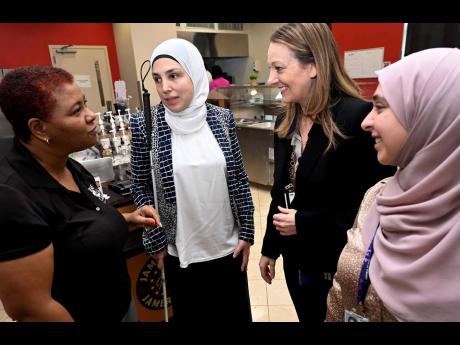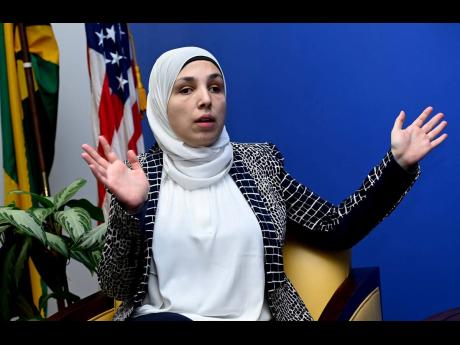Journalists challenged to change narrative on disabilities
US Special Adviser calls for society to look at affected individuals’ potential to contribute and enrich communities
Journalists have been challenged to become more active in helping society to see persons with disabilities through different lenses, to erase the long-held perception that they are to be pitied. The goal is for society to look beyond their particular challenges and see their potential for contributing to and enriching communities in which they live and work.
The call was made by the United States of America’s Special Adviser for International Disability Rights Sara Minkara during a recent visit to Jamaica in an interview with The Gleaner at the US embassy.
“Disability inclusion is still a big challenge because society still sees us from a point of charity, pity, a burden,” said Minkara, an Arab-American Muslim woman who has been blind since the age of seven. “We need to fix that. Until we change that, we are always going to see persons with disabilities being marginalised.
“Some work has been done, but there is much more to be done in every single country, and I would never say that disability inclusion is fully achieved anywhere. It’s a journey. So us coming here is like sparking this interest and bringing it to the forefront, most of all meeting with you from the media world to talk about the narrative change and what can be done more on disability inclusion.”
During her visit she met with representatives from the Jamaica Council for Persons with Disabilities, the Jamaica Society for the Blind, and the Jamaica Association for the Deaf to learn more about Jamaica’s efforts to increase economic and social opportunities for persons with disabilities, Minister of Tourism Edmund Bartlett, and Minister of Labour and Social Security Pearnel Charles Jr.
She also used the opportunity to sample some of Jamaica’s culinary delights such as curried goat, sip some Blue Mountain coffee, and visit the world-famous Dunn’s River Falls in Ocho Rios, St Ann.
The trip was in keeping with the United States’ support for Jamaica’s efforts in implementing the Disabilities Act, which came into effect in 2022, and outlines provisions for greater inclusion of persons with disabilities in Jamaican society, in accordance with the UN Convention on the Rghts of Persons with Disabilities.
Appointed in November 2021, Minkara and her team have been mandated to lead the US Government’s foreign policy on disability across the world.
“Our goal is to advance the rights of voices of persons with disabilities all over the world, to ensure that there is disability inclusion across all sectors, whether it’s in economics, peace, and security, all aspects of society,” she explained.
Founded a non-profit
Having dedicated her life to promoting inclusion as a value and to the empowerment of others to reach their potential, at college, Minkara founded a non-profit service organisation, Empowerment Through Integration (ETI), which supports children with disabilities through life-skills training. She led and grew ETI while pursuing her undergraduate degree in math and economics at Wellesley College and continued her education at the Harvard Kennedy School, graduating with a master’s degree in public policy.
In addition, she has advised and addressed numerous academic, government, and policy groups on issues related to disability, inclusion, adaptive leadership, and social entrepreneurship, United Nations in New York and Vienna, tours in Africa and Asia on behalf of the US State Department and speaking engagements across five continents.
As a result, she has been recognised for her many contributions through appointments and awards.
Interestingly, Minkara, continues to draw inspiration from people in the different places she has visited.
“I have always met and still meet people with disabilities and the power that they bring forward reflect in the work that local organisations are doing and keeping at it, even though there is so much resistance in the society,” she stated.
“Those are the stories that are inspiring, such as when I met an association in Thailand that is training farmers with disabilities, or in Mozambique, I met this port company that is employing persons with disabilities because they see the value in it. Those are the stories that are inspiring and really help me to keep doing the work with my team because it’s not easy,” Minkara added.
Following meetings with ministers Bartlett and Charles Jr., Minkara is convinced that Jamaica is on track to making her goal a reality.
“Couple of things: one is with the minister of tourism. He actually really is now committed to making sure that they are included into accessible tourism, and I think that’s going to be huge not just for tourists, but also for the Jamaican community. Tourism engages all aspects of society, and when you make it accessible, then you are also going to be able to bring that to the Jamaican community. So that commitment from the minister was really great,” she shared.
“I also met with the minister of labour and oscial security, and we talked about how do we ensure that there is a disability focal point in every single agency? Not just in education, healthcare, social security, but (in) every single agency, (the) ministry should be thinking about disability inclusion. So those kinds of conversations to really take things forward in that way is going to be very important.”
Minkara went on to explain that the initial purpose of her visit was to spark the disability inclusion conversation on the political level as well as to get input from civil society. She explained that the central idea is to bring disability inclusion to the forefront of people’s minds, get more of them interested, and then having this continuous conversation in moving forward. That mission, she said, was accomplished, and despite the hectic schedule, she and her team got a taste of Jamaica.
“We did go to Café Blue, and it was good, but Dunn’s River Falls? Beautiful. We went there for a day. I mean the waterfall, it was really packed. It was really busy. I loved the drive,” she shared with a winsome smile at the recollection. “You pull down the window and you have the wind blowing in your face, and the weather was really nice.”


